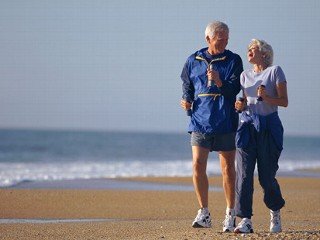There are incredible benefits found in older populations who exercise regularly. There is evidence that older people experience the same benefits that younger people experience from physical activity. This study below tells us that exercise increases blood flow to muscular tissues, allowing us to build muscle the same way, in both young and aged people. This means that you can still build muscle at any age. It is never too late to start increasing your health by exercising!
“These results demonstrate that the angiogenic response to aerobic exercise training is not altered during the aging process in humans. In addition, muscular activity-associated increases in interstitial VEGF protein may play an important role in the maintenance of skeletal muscle capillarization across the life span.”
Gavin, TP, et all, No difference in the skeletal muscle angiogenic response to aerobic exercise training between young and aged men. J Physiology 2007 Nov 15;585(Pt 1):231-9.
In fact, exercise in older populations is particularly important. There is significant evidence to show that exercise can promote healthy mental status in older people, improving memory. This study reviewed most of the available research on exercise in aging populations. It found that exercise has repeatedly been shown to aid in memory issues and mental health in older populations. The greatest benefits were shown in women.
“…although fitness training broadly influenced a variety of cognitive processes, the largest positive effects were observed for executive control processes. Executive control processes include components of cognition such as planning, scheduling, working memory, inhibitory processes, and multitasking. Interestingly, these are many of the processes that show substantial age-related decline. Second, effects of fitness training were larger when programs of aerobic training were combined with strength and flexibility training. Combinations of different treatment protocols may engender both more varied brain changes and serve to further reduce age-associated cardiovascular and muscular skeletal disorders. Third, and perhaps most interestingly, studies that included more women showed larger fitness training benefits than studies with fewer women.”
Kramer, AF. Exercise, cognition and the aging brain. J Appl Physiol.2006 Oct; 101(4):1237-42.

